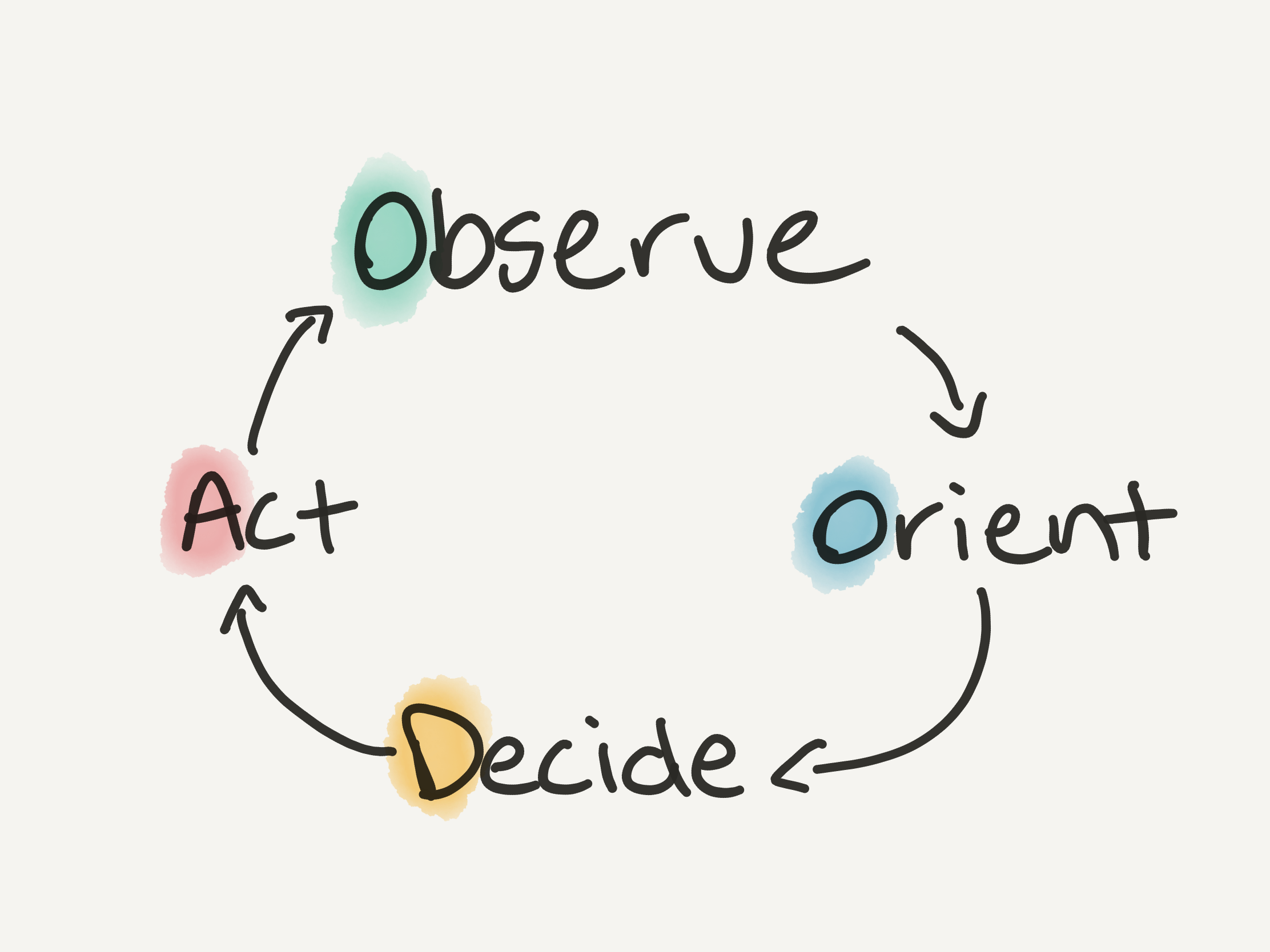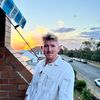How fast is your OODA loop?
Originally developed for Air Force combat, the OODA loop (observe, orient, decide, act) can be applied in any battle. Even when the opponent is oneself.

Observe, orient, decide, act.
Again.
Observe, orient, decide, act.
Faster.
Observe, orient, decide, act. Observe orient, decide, act.
How fast can you go?
Your speed decides whether or not you win. And you want to win right?
The OODA loop is a military strategy designed by US Air Force Colonel John Boyd.
But you can apply it anywhere.
The whole premise is speed can overcome power. The faster you close your OODA loop, the faster you observe your environment, orient yourself, decide what to do and act upon it, the more information you gain from the environment. And information equals power.
If you’re fast enough, eventually you begin acting faster than your opponent can even observe what’s going on.
While they’re busy watching (observing) and trying to understand what’s happening (orienting) you’ve already decided what to do and acted upon it. Perhaps you’re even on your second or third iteration.
In turn, your agility, your ability to act swiftly, paralyses your enemy (and in turn, a slow OODA loop paralyses you).
Observe
The main objective here is to answer the question: what’s going on?
Others include:
- What are the most important things I need to know?
- What’s my enemy doing?
- Where am I going?
To begin with, you don’t need to get too specific. This’ll slow you down.
The more OODA loops you complete, the more specific you can get.
Observations following an action are more reliable than observations on their own.
Orient
Now you’ve got an idea of what’s going on, ask: how can I best position myself?
Do you need to change physical location?
Perhaps your physical location is fine and it’s your thought process which is broken.
Orient yourself to remove such obstacles. Physical or mental.
Decide
If you know where you want to go, what’s your next best step?
Of course, impossible to know ahead of time.
But the central idea of the OODA loop to gain as much information as possible as fast as possible.
Like a mad scientist, experimenting voraciously, decide on a hypothesis (or theory, idea) to test, one per OODA loop.
Act
Many of your experiments will fail. No matter. That’s the most powerful kind of knowledge: what doesn’t work.
And because of your speed (you’re going fast right?) you’re figuring out what doesn’t work faster than your enemy figures out what’s going on.
Figuring out what doesn’t work gives you more of a chance to figuring out what does.
Examples
The above steps are straightforward.
Observe, orient, decide, act. The more you complicate it, the more you slow down your OODA loop.
But what’s the name of the game?
Speed.
Let’s get specific.
Apple’s HomePod
Apple pulled its HomePod product recently. One of the most valuable companies in the world canning a product line.
From one angle you could argue they took too long.
Other companies, Amazon, Google, already had products in the market (Alexa, Google Home). They’d completed several iterations of the OODA loop before Apple had completed one.
By the time they got to market, they’d missed the opportunity.
Customers had gotten used to other companies’ products. And changing their habits is a hefty task.
From another angle you could argue Apple wanted to observe and wait to act as best they could.
Sure, this may work for a large company with the resources.
But thanks the internet, many of us have been taught to value speed.
In the eyes of the OODA loop, something which is 90% as good as it could be but in front of us now is better than something 100% as good as it could in front of us later. Even so, perfection is a myth.
China’s hospital building
When COVID started to break out, I remember hearing stories of China constructing make-shift hospitals in 6-days.
6-days?
What other country could accomplish such a thing?
I live in Australia. Building a hospital here could take 10-years.
China’s OODA loop hit warp speed. Even if the hospital wasn’t perfect, they were gaining information about the situation through their actions, through the real world.
The observer makes decisions based on fantasies, the experimenter makes decisions based on reality.
Tesla’s self-driving cars
Self-driving car companies have popped up everywhere. I got an invite to work on one, it said they’d solved self-driving in a way others hadn’t yet.
That’s cool, I said, can I read about your progress anywhere?
Oh we haven’t published anything yet, our ideas are still in research.
What?
Tesla on the other hand, have hundreds of thousands of cars on the road.
Thousands of cars driving through their own OODA loops, contributing to Tesla’s overall OODA loop.
Does this result in winning the race to self-driving?
Who knows. But it makes complete sense when you consider the analogy of reading books on learning to swim versus getting in the water.
David vs. Goliath
A small team can do things a large team can’t. The number one being: moving faster. They can close more OODA loops. While a group of 100 engineers may be debating over what system to build, the small team of 2–3 engineers are already on version 5.
Yes, some projects require a large and skilled team.
But we live in the age of the internet. And the internet loves speed. The internet loves the indie hacker, the indie writer, the one on the ground sharing their creations with the world.
I’m 75kg (165lbs). When I wrestle Big Lachy (127kg, 280lbs), if I wait too long to observe what he’s doing, I get crushed. But if I move, move, move (act, act, act), I’ve got a chance.
You vs. you
Originally designed for combat against opponents, the OODA loop can help even when the opponent is oneself.
Observe too much and you’ll paralyse yourself with fear.
The solution?
Roman armies figured it out. They had a saying: action removes fear.
In other words, if you’re stuck, speed up your OODA loop.
Hat tip: I first heard of the OODA loop concept on the LindyMan podcast with Marc Andreessen, great listen.
